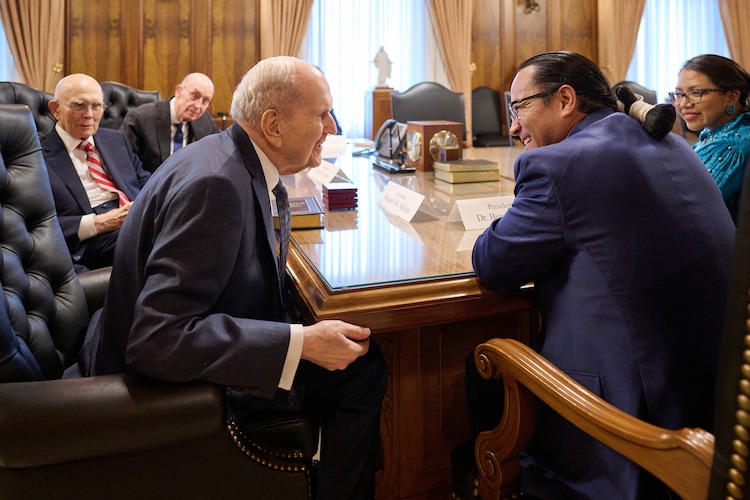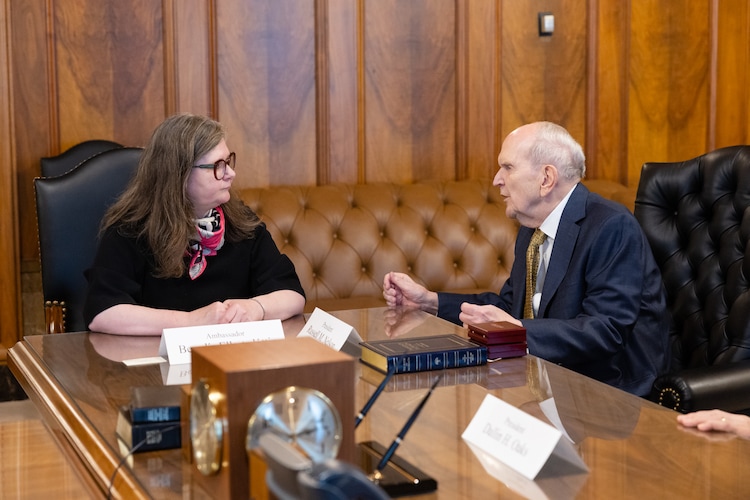Most heads of state who stop in Utah take an obligatory meeting with top leaders of The Church of Jesus Christ of Latter-day Saints.
And Ukrainian President Volodymyr Zelenskyy was no different.
But the courageous leader of a war-ravaged nation didn’t sit down Friday with the church’s prophet-president, 99-year-old Russell M. Nelson, or either of his two counselors, Dallin H. Oaks and Henry B. Eyring, in the governing First Presidency. Even though all three Latter-day Saint leaders are in their 90s, they often meet with visiting dignitaries.

(The Church of Jesus Christ of Latter-day Saints) President Russell M. Nelson speaks with Navajo Nation President Buu Nygren during a visit in the Church Administration Building on Thursday, Feb. 15, 2024.

(The Church of Jesus Christ of Latter-day Saints) President Russell M. Nelson speaks with Bergdís Ellertsdóttir, Iceland's ambassador to the United States, in Salt Lake City on Thursday, Jan. 18, 2024.
Instead, Zelenskyy had a private exchange with a church delegation led by apostle Quentin L. Cook, spokesperson Irene Caso said in an email. “They discussed the church’s presence in Ukraine and humanitarian assistance throughout the region.”
While certainly a high-level church authority, Cook is in the second tier of leadership, the Quorum of the Twelve Apostles, which ranks beneath the First Presidency.
For his part, the Ukrainian president welcomed his audience with the church representatives and the chance to share his country’s plight.
“I spoke about the spiritual toll that Russian terror has had on Ukraine and Ukrainians, specifically the 170 ruined and hundreds of damaged religious organizations,” Zelenskyy wrote later on X, formerly called Twitter. “I was pleased to learn from Elder Quentin L. Cook that The Church of Jesus Christ of Latter-day Saints has been conducting its humanitarian activities in Ukraine since 1994. And on July 8th, its volunteers also assisted the victims of the Russian strike on Okhmatdyt Children’s Hospital. I am grateful to The Church of Jesus Christ of Latter-day Saints and its members for their active volunteer efforts, humanitarian assistance, and prayers.”
The Zelenskyy-Cook meeting may be further evidence that the Utah-based faith, with 17.2 million members around the world, is striving to steer clear of global politics.
Shortly after Russia invaded Ukraine in February 2022, the church issued what some observers saw as a weak statement, lamenting the bloodshed and pleading for a speedy peace without naming either warring nation.
Of course, one reason for the guarded comments may have been that thousands of Latter-day Saints can be found in Russia and Ukraine. The February 2022 news release even noted that the church “has members in each of the affected areas.”
Another clue came a year later, when the church amended its long-standing statement on political neutrality.
“The church does not seek to elect government officials, support or oppose political parties, or, generally, take sides in global conflicts,” the guidelines state. It is “neutral in matters of politics within or between the world’s many nations, lands and peoples.”
That means the faith does not “typically issue statements regarding disputes in or between nations, lands or peoples; rather, it teaches the gospel of Jesus Christ, with the knowledge that living these principles limits contention and hostilities.”
At the same time, the church does “provide humanitarian assistance around the world, including areas of international conflict,” the new neutrality statement explained. “While political strife may be a factor in causing the need for assistance, the church will generally not comment on the conflict itself.”
That likely means members of the First Presidency will continue to be cautious about how much to publicly support presidents and prime ministers who knock on their door — no matter how worthy their cause seems to be.








